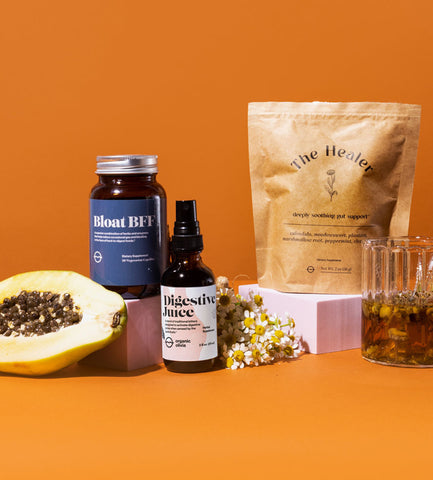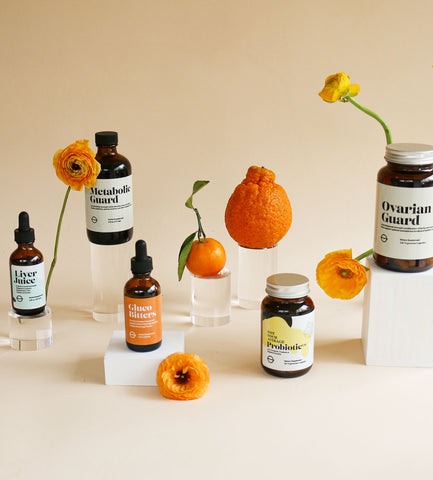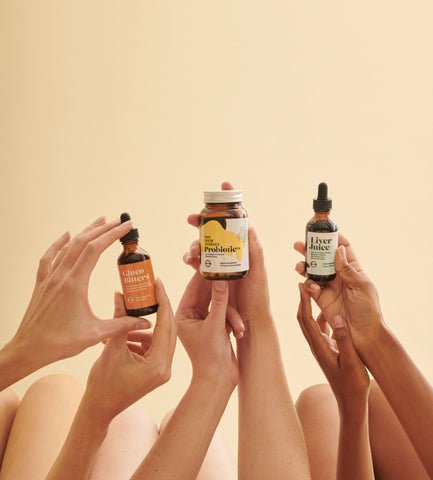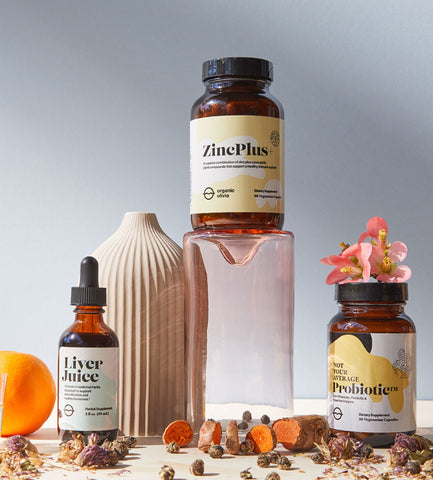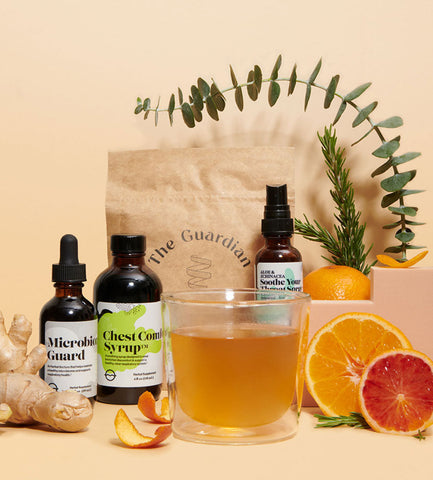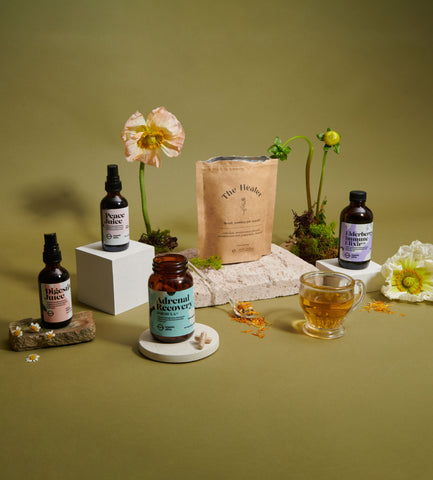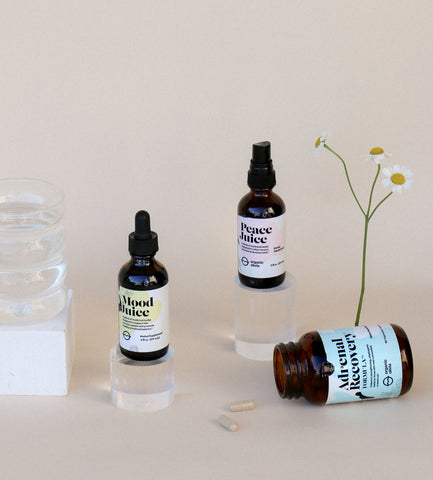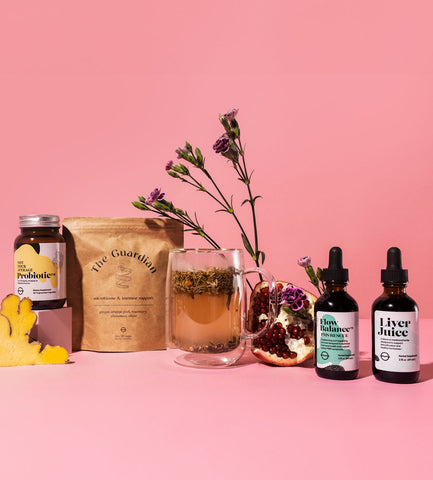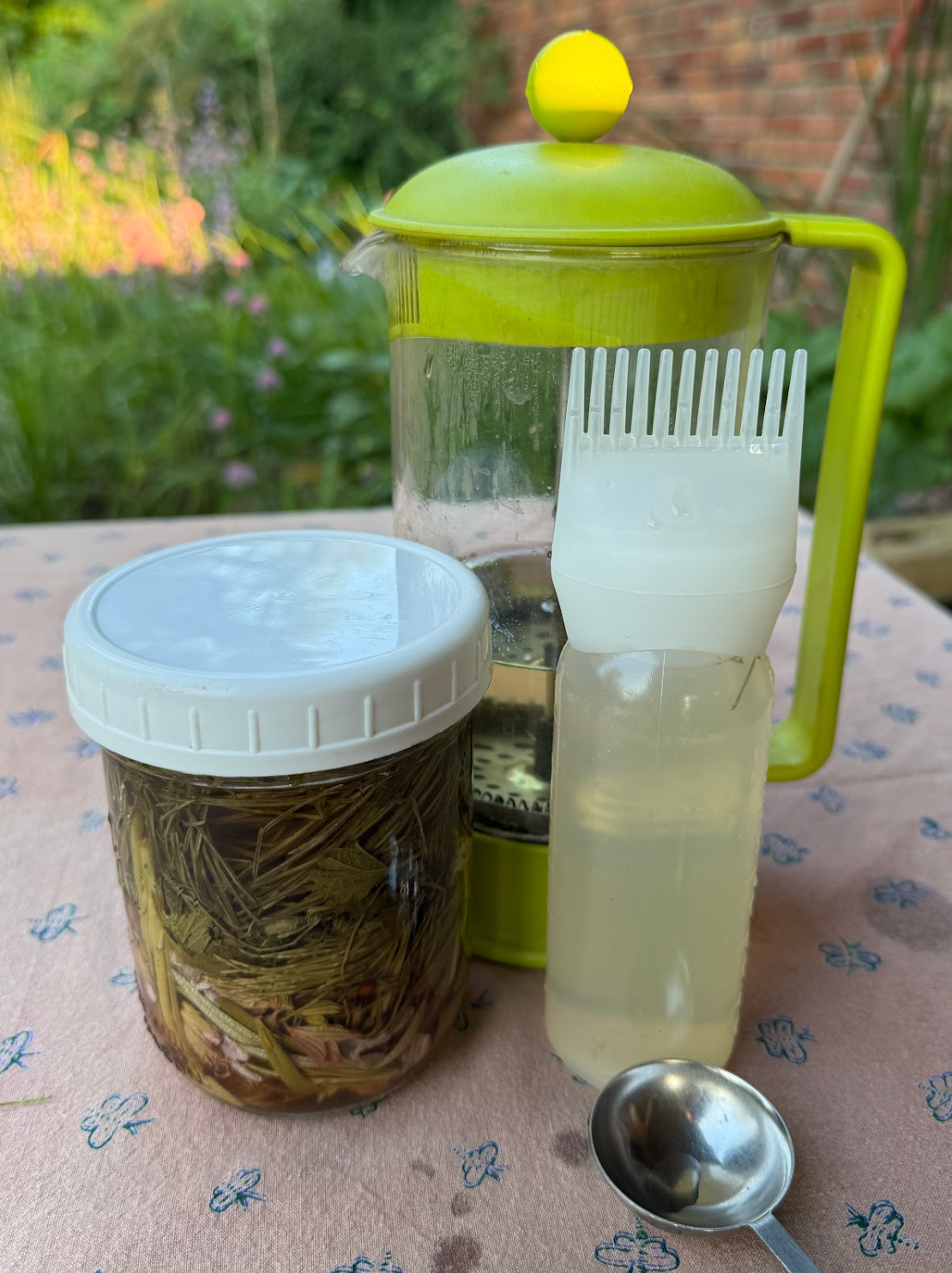When it comes to skincare, most of us start with the surface, investing in gorgeous serums, active enzyme masks, or buzzy facial treatments. And while topical care is a wonderful ritual (we love a multi-step routine as much as the next gal), the truth is that what’s happening on your skin is a direct reflection of what’s happening inside your body. More often than not, the roots of skin imbalances trace back to the gut.
That’s thanks to the gut-skin axis: a dynamic, two way communication channel between your digestive system and your skin. In other words, what happens in your gut definitely doesn’t stay in your gut.
Your Inner and Outer Shields
Your gut and your skin have more in common than you make think. Both are massive epithelial barriers that protect you from the outside world, both host thriving communities of microbes, and both rely on these microbes to keep your immune system regulated.
When the gut microbiome is disrupted (by antibiotics, stress, infection, food sensitivities, or even travel), inflammatory skin conditions may arise. Think about it: have you ever noticed a breakout after eating sugar or dairy? Or rosacea flaring up after a round of antibiotics? That’s the gut-skin axis in action. Once you understand the connection, it’s easy to see why supporting your gut microbiome becomes a skin care MUST.
How Your Gut Talks to Your Skin
Most of the cross-talk between your gut bacteria and skin cells happens through immune messengers and small metabolic compounds. For example, beneficial gut bacteria produce hormone-like molecules and short-chain fatty acids (SCFAs) that travel through your body to help calm inflammation or even block harmful bacteria from taking root.
Tight protein junctions act like velcro between gut lining (epithelial) cells, preserving the integrity of your intestinal wall. Yet when your microbiome gets imbalance and dysbiosis occurs, those proteins can loosen, creating gaps between cells – a phenomenon called intestinal permeability or “leaky gut”. This allows food particles, toxins, and inflammatory compounds to sneak into circulation where they can trigger systemic inflammation and frustrating skin flare-ups.
Here’s the best part! Gut-derived SCFAs like butyrate not only reinforce your gut lining, they also help keep inflammation in check and discourage problematic bacteria (like Staphylococcus aureus, a known culprit in eczema) from overgrowing on the skin. You can support these beautiful SCFAs by:
-
Feeding your beneficial gut bacteria with fiber (especially soluble fiber, resistant starch, and prebiotic-rich foods)
-
Including fermented foods in your meals
-
Taking a targeted probiotic that contains Lactobacillus and Bifidobacterium (and prebiotic fibers if possible!), like Not Your Average Probiotic.
An advanced prebiotic, probiotic, enzyme blend designed to support gut microbiome diversity, skin health, digestion and elimination.* STAR HERB: Lactobacillus rhamnosus GG.
Not Your Average Probiotic
-
Eat foods high in polyphenols (berries, dark chocolate, green tea, etc)
-
Minimize gut stressors
-
Consider a butyrate supplement
Also, since nearly 70% of your immune cells live in your gut mucosa, the microbes there help “train” your immune system by teaching it when to calm down, when to fight, and how to maintain tolerance. This doesn’t start and stop in the gut, rather, it also shapes immune activity in your skin.
How Gut Dysbiosis Shows Up on Skin:
Science is undoubtedly catching up to what Traditional Chinese Medicine (TCM) and herbalists have longgg intuited: imbalances inside often show up outside. For instance, when it comes to skin:
-
In psoriasis, higher levels of gut barrier damage markers (like I-FABP and claudin-3) are linked with more severe symptoms. In several studies, harmful gut bacteria worsened psoriasis inflammation by ramping up pro-inflammatory cytokines like TNF-α and IL-17 (1, 2, 3).
-
Western-style diets high in processed foods, sugar, and trans fats disrupt gut balance, increase systemic inflammation, and fuel acne breakouts. Randomized clinical trials show that probiotics can significantly reduce acne severity (4, 5).
-
In eczema, oral probiotics have been shown to reduce the SCORAD (severity scoring of atopic dermatitis) index by up to 83%, compared to just 24% with placebo, with less itching, fewer lesions, and better skin barrier recovery (6, 7).
The Role of Probiotics in Skin Health
Oral probiotics downregulate systemic inflammation, bring balance back to the gut microbiome, strengthen the gut lining, and support immune regulation. Certain strains of Lactobacillus and Bifidobacterium are especially well studied for skin health (8). Clinical trials suggest they can:
-
Reinforce tight junction proteins, reducing intestinal permeability/leaky gut
-
Calm systemic inflammation
-
Boost production of beneficial SCFAs, like butyrate
-
Improve outcomes in acne, eczema, and psoriasis
But! Not all probiotics are created equal. First off, many don’t survive the harsh journey through stomach acid, and even if they do, they need the right food (prebiotics) to thrive. That’s why we created Not Your Average Probiotic, a 3 in 1 formula designed to support the gut-skin axis from multiple angles. Each capsule contains:
Not Your Average Probiotic is a unique combination of probiotics, prebiotic fiber and ...
Not Your Average Probiotic
-
Microencapsulated live bacteria that survive stomach acid and actually reach your gut
-
Prebiotic fibers to feed your good bugs and promote microbial diversity
-
Fermented enzymes that support smoother digestion and reduce bloating



